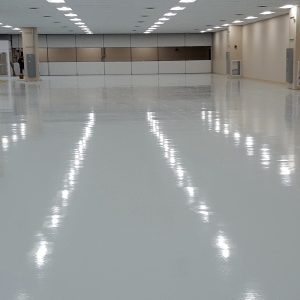Epoxy floors offer the following advantages: They are available in many colors and patterns, they are relatively affordable, and it has superior structural soundness to other materials. Epoxy flooring is known for its excellent dimensional stability, chemical and thermal properties, and high tenacity. Epoxy flooring is very resilient to chemical and thermal shocks when properly applied. It also has low shrinkage when applied on bare floors. Epoxy resins can be used to repair small damages. They bond easily with many materials like wood and vinyl and require very little or no cleaning once they are applied. Epoxy floor coatings are gaining popularity in a variety of industries due to these advantages.
Epoxy floor coatings have many major benefits. These include the following: epoxy flooring has a great noise reduction, which is a major benefit over other floor coatings. Epoxy reflects sound back in the same direction it came from, instead of bouncing it back to other directions. Epoxy floor coatings are also excellent at insulating heat, making them a great choice for industrial floor coatings.
Before you can apply epoxy floor coatings, you need to prepare the surface. The majority of epoxy floor coating systems come with an application tool. It consists of a roller, a reservoir, and a sprayer. epoxy systems is usually applied using one tool. However, in some cases, a two-piece system may be required. There are many compositions available for epoxy resin, some of which can be specially blended to make specific coatings. Epoxy resins can even include UV inhibitors to protect floors from excessive sun exposure. You should clean all surfaces that might be contaminated with dirt or dust before applying the resin system.
You can mix the resins with different liquids to create different colors and effects. Epoxy floor coatings are the best option if you want a durable surface. Epoxy floor coatings are a good choice for protecting the flooring from liquids. Hard wearing flooring options can be used to coat bathroom floors. However, they won’t work well on kitchen floors or bathrooms. Epoxy works well with ceramic tile floors. However, epoxy might not work as well with granite or marble flooring.
No matter the reason for applying epoxy flooring coatings, it is important to prepare the floors in order to ensure the resins adhere to the surfaces. It is easiest to sweep the floor and then mop it with a nonskid mop. Before the coating is applied, any debris, such as food crumbs or oil tracks, can be removed. You will need to sweep the floor again if there are many foods or other materials.
After cleaning the floor and removing any debris, apply a thin layer of primer. Primer acts by creating a protective layer above the paint. Primer provides additional protection to the paint and prevents the resins chipping or peeling. It is easy to apply primer. There are two parts: a thin primer layer and a clear topcoat.
Concrete floors should be sealed and prepared for epoxy flooring services. Sealing floors can help reduce moisture buildup and prolong the floor’s life. The process of applying the sealant is simple and can be completed in a matter of hours depending on how much traffic your floors receive. It will give your floors a high gloss finish that will protect you from stains and any other damage over time.
The clear topcoat is applied next to the epoxy floor coating process. You can either apply the clear topcoat by rolling plastic strips over the wet areas or using a brush. The latter is preferred by most people as it gives the clear topcoat more time to dry and bond to concrete. This last step is the easiest and most time-consuming.


Comments are closed